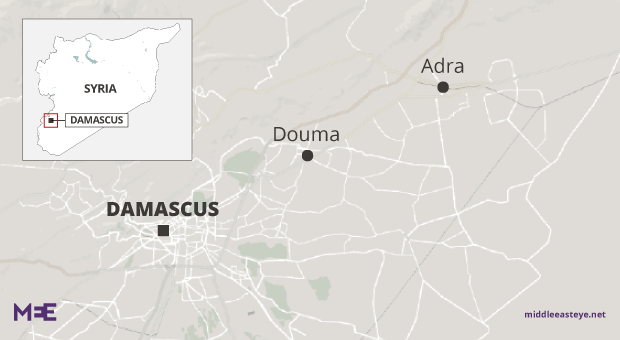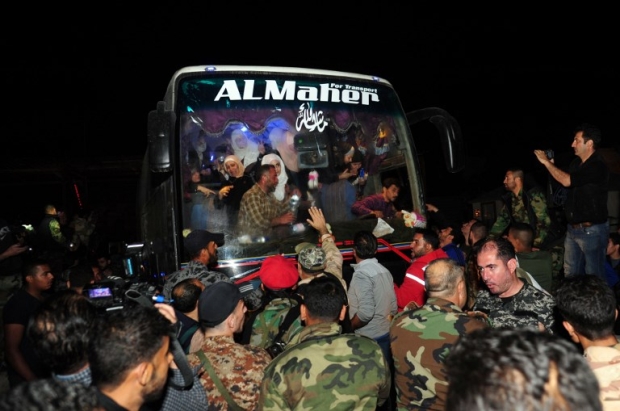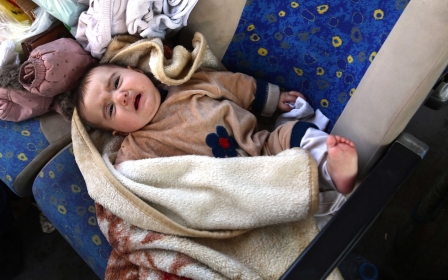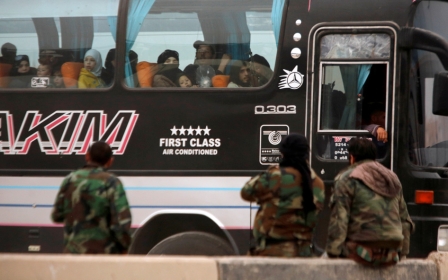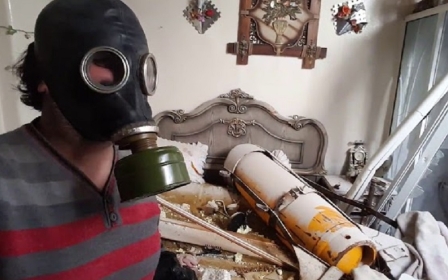Jaish al-Islam says it inflated hostage numbers, leaving Syrian families in the dark
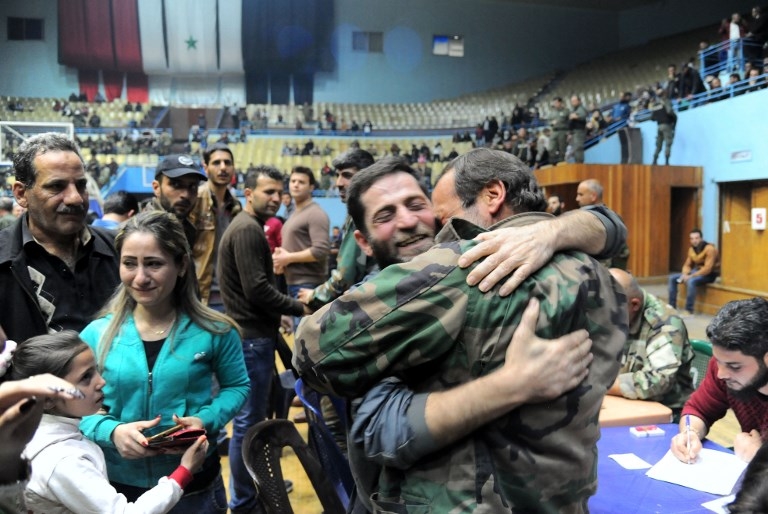
The rebel group which held the last pocket near Damascus before its surrender this week exaggerated hostage numbers in order to gain leverage in negotiations with the Syrian government and Russia, a spokesman for the group has told Middle East Eye.
Syrian government officials have put the figure of those held by Jaish al-Islam at around 5,000, although some Syrians, according to various reports, believe the figure is over 7,000. The Syrian Observatory for Human Rights, which is frequently quoted in Western media, put the figure at 3,500.
But Ammar Hassan, a spokesperson for Jaish al-Islam, told MEE on Friday: "The exact numbers were around 500 only and they were handed to the regime before we left."
'Whoever took our sons had to bring them back. Where are they? Bring them back'
- Woman crying as other familes are reunited with Douma hostages
MEE has heard similar accounts this week from recently fled residents of Douma, and journalists and researchers covering the city, who put the total between 400 and 1,000.
Some of the remaining hostages, they say, were being held in makeshift prisons in basements and were killed during the shelling of Eastern Ghouta which killed at least 1,700 people in rebel-held areas in recent weeks.
The revelation will leave thousands of Syrians whose family members have disappeared during the seven-year war and were hoping they would emerge from Douma with major questions over where their relatives have gone.
Earlier this week, as journalist Sam Dagher reported in the Atlantic, a spontaneous protest erupted in the capital as relatives who expected to find their relatives among released hostages from Douma were left empty handed.
A hashtag (#بدنا العساكر - 'We want the soldiers') has also been launched on Twitter as users discuss their frustration with the government.
In footage shared with MEE from a stadium in Damascus where the Douma hostages were brought on Monday, relatives wait eagerly as only some families are reunited with their loved ones.
"Whoever took our sons had to bring them back. Where are they? Bring them back," one woman screams, motioning to the returned hostages. "How are these still alive?"
Elizabeth Tsurkov, a research fellow at the Jerusalem-based Forum for Regional Thinking who focuses on Syria and has been in close contact with Douma residents, told MEE: “It is clear that many families expected their sons to be released.
"But photos from battles in Ghouta, especially this year, showed hundreds of corpses of regime fighters. Fighting has raged in Ghouta for over five years. Many families hoped that their sons are alive and in captivity (and this was fuelled by Jaish al-Islam bragging about holding many prisoners of war). Believing that your son is alive is easier than thinking that his corpse is rotting in some ditch in Ghouta.”
Keeping the war going
For almost five years, Jaish al-Islam had controlled the besieged Eastern Ghouta town of Douma and was holding hostages who had been captured during the group's assault, along with the Al-Nusra Front, in December 2013 on the nearby town of Adra.
Hours after a suspected chemical weapons attacks on the town last Saturday - the same attacks which have spurred the US, France and the UK to consider military action - the group reached a final agreement with Russia and the Syrian government for the evacuation of Douma.
One Jaish al-Islam member has said that the attack was what finally pushed the group's withdrawal.
But when only 200 hostages were released in exchange for the safe passage of 8,000 fighters and 40,000 of their family members, many questioned what Jaish al-Islam had done with thousands of Syrians.
Some suggested Jaish al-Islam had killed the remaining people. A major international aid organisation told MEE that it had no idea what the number might be because it hadn't had unimpeded access to the town.
But according to interviews this week with Jaish al-Islam's spokesperson, recently displaced residents and researchers who have been in regular contact with those in besieged Douma, the group has only ever held hundreds of hostages over the past five years.
Shadi, a journalist working in Douma who declined to give his last name for fear of his safety, said the group held just under 600 hostages, but had also been passed hostages from other groups "which could reach a maximum of around 1,000".
A second resident of Douma, who has lived there during the course of the war and is not connected to Jaish al-Islam, said he believed the much higher figures had been "only claims".
"The number is exaggerated," he said, declining to use his name for fear of retribution.
Mohammed Sarmini, the director of the Jusoor Study Centre, an Istanbul-based think tank focusing on Syria which has an office in Douma, said he estimated that the group had only held 400 hostages total.
"The majority of prisoners were Alawites or soldiers, and there may have been civilians but I can’t confirm to what extent or number," Samini told MEE this week.
But it wasn't just the group that used inflated numbers to leverage its power: the government, he said, exaggerated numbers to encourage soldiers to attack Douma.
"They needed to paint Jaish al-Islam as terrorists, who have kidnapped a large number of civilians and so the war needs to continue."
'Pained hearts'
The new details confirm what many Alawi families came to discover this week when buses arrived at a stadium in Damascus without their missing relatives, as The Atlantic reported.
With the news of Jaish al-Islam's surrender, families had descended on Damascus "expecting to be reunited with their loved ones," Dagher wrote.
But when only 200 hostages arrived and state media announced that they were the only living prisoners that would be coming from Douma, the families protested, marching to one of Damascus' biggest traffic intersections, as Dagher reported and video of the protest shows.
On social media, under the #بدنا العساكر ('We want the soldiers') hashtag, users also expressed their frustration and anger over the missing thousands.[Translation: #
Tsurkov said that part of the disparity in the numbers could be that those abducted died from air strikes or shelling, or from torture or hunger, but she said she couldn't imagine such a "huge disparity" due to deaths.
"In many cases, soldiers died in the battlefield but for some reason their families chose or were led to believe that their sons were still alive and held hostage," she said.
Among those who are left wondering are the friends and family of four Syrian human rights activists - Samira al-Khalil, Razan Zeitouna, Wael Hamada and Nazim Hammadi - who were kidnapped in Douma in December 2013.
It is unthinkable that the emirate that has established itself to kidnap, arrest, torture and assassinate is disintegrating today, and the fate of its victims remains unseen
- Supporters of four Syrian human rights activists missing from Douma since 2013
In an appeal released on Friday, the activists' supporters said that all evidence had pointed to Jaish al-Islam's responsibility for their abduction and asked for help in finding out what happened.
"It is unthinkable that the emirate that has established itself to kidnap, arrest, torture and assassinate is disintegrating today, and the fate of its victims remains unseen," they wrote. "There is no justice, conscience, law or issue that can justify the continuation of those who can speak in silence.
"Samira, Razan, Wael and Nazim have families, loved ones and friends who have suffered the pain of their absence without the help of public bodies for more than 50 months. They ask: Where are our loved ones? Why does not someone say anything?"
Hassan, the Jaish al-Islam spokesperson, told MEE on Friday that the group didn't take the four activists and doesn't know where they are now.
'You didn't care'
The confusion over whether Jaish al-Islam was holding hundreds or thousands of Syrians highlights just how thick the fog of war has become in Syria.
Lines had blurred so much that the group, which reportedly paraded the hostages in cages around Eastern Ghouta in 2015 as human shields, had rescued some of them from bombarded basements weeks before their surrender.
One of the recently released hostages, who spoke to MEE on condition of anonymity, said she and 10 other imprisoned female family members were being held in a basement in late March when bombs hit the building.
“We were unconscious for hours… when they [Jaish] were finally able to get us out by making a hole in the wall, bombs were raining down on us," she said. "I’ve never seen so much bombing. Missiles were soaring into the building, causing pieces to fall down on us."
“My sister and another girl were trapped under the rubble. Why did they have to face such criminality? More shelling came and they were killed."
“Why did you [government] do this?" she asked. "You launched a campaign against Eastern Ghouta, and you didn’t care about the prisoners, you didn’t care about the civilians.”
The Syrian government has been contacted for comment.
Additional reporting contributed by Olivia Alabaster.
This article is available in French on Middle East Eye French edition.
New MEE newsletter: Jerusalem Dispatch
Sign up to get the latest insights and analysis on Israel-Palestine, alongside Turkey Unpacked and other MEE newsletters
Middle East Eye delivers independent and unrivalled coverage and analysis of the Middle East, North Africa and beyond. To learn more about republishing this content and the associated fees, please fill out this form. More about MEE can be found here.


